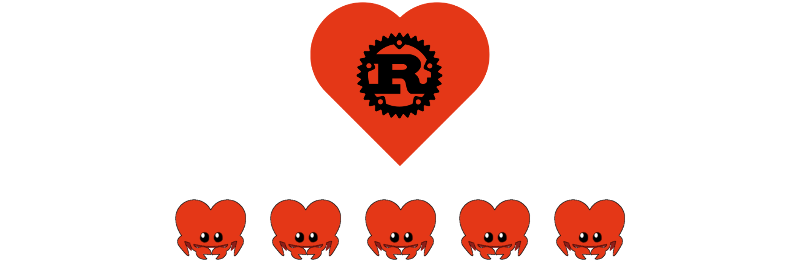Why is Rust loved? 5 developers, 5 stories

For us, this 5th title was the trigger to share why we love Rust; in the form of 5 personal stories.
The meaning of love
But, first things first. Let's start by clearing up what "most loved language" means. A common misconception, it does not mean "loved by most" or "most popular". That is an entirely different category. StackOverflow defines "most loved" as follows;
% of developers who are developing with the language or technology and have expressed interest in continuing to develop with it
Now, one can argue (deeply) about the correct definition of love, but this one seems reasonable when you think about it. If you like something you want to stick with it. Considering also that Rust is leading by a mile and has done so for 5 years, it is safe to say that indeed something lovely is going on here.
More Rust!
At this point, you might wonder why we are so intent on sharing. Simply put, we’d like to do more work with Rust.
Looking back, our love has evolved over the course of these last five years. Starting with personal projects, gradually growing from internal tools to commercial projects, first for web, and recently our first embedded gig. Along the way, our conviction that Rust is the right tool for quite a few jobs has only grown stronger. We'd like to see Rust grow further, become more popular, and be adopted by a growing number of tech companies [2].
5 developers, 5 stories
So here we are. We'd like to tell you why we love Rust from our personal experience in a 5 part series: 5 years of love, 5 developers, 5 stories.
In the coming weeks, we’ll add a new story on day 5 of each week (that is, 1-indexed weekdays starting on Monday). Lars, Marlon, Wouter, Henk Dieter, and Ruben will tell you why they love Rust.
First up is Henk Dieter, Rust, my first embedded language.
The series
July 24th: Henk Dieter - Rust, my first embedded language
July 31st: Ruben - Rust Wide Web
August 7th: Marlon - A racing bike with training wheels
August 14th: Lars - Functional Rust?
August 21st: Wouter - Rust will be the Constant in your Life
Resources
- [1] this years survey and previous ones are here: 2020, 2019, 2018, 2017, 2016
- [2] Not just Mozilla: a long list of major companies including Sentry, Google, Cloudflare and recently Discord and Microsoft argue for the use of Rust
- Developers talking about why they love Rust in an in-depth article on StackOverflow